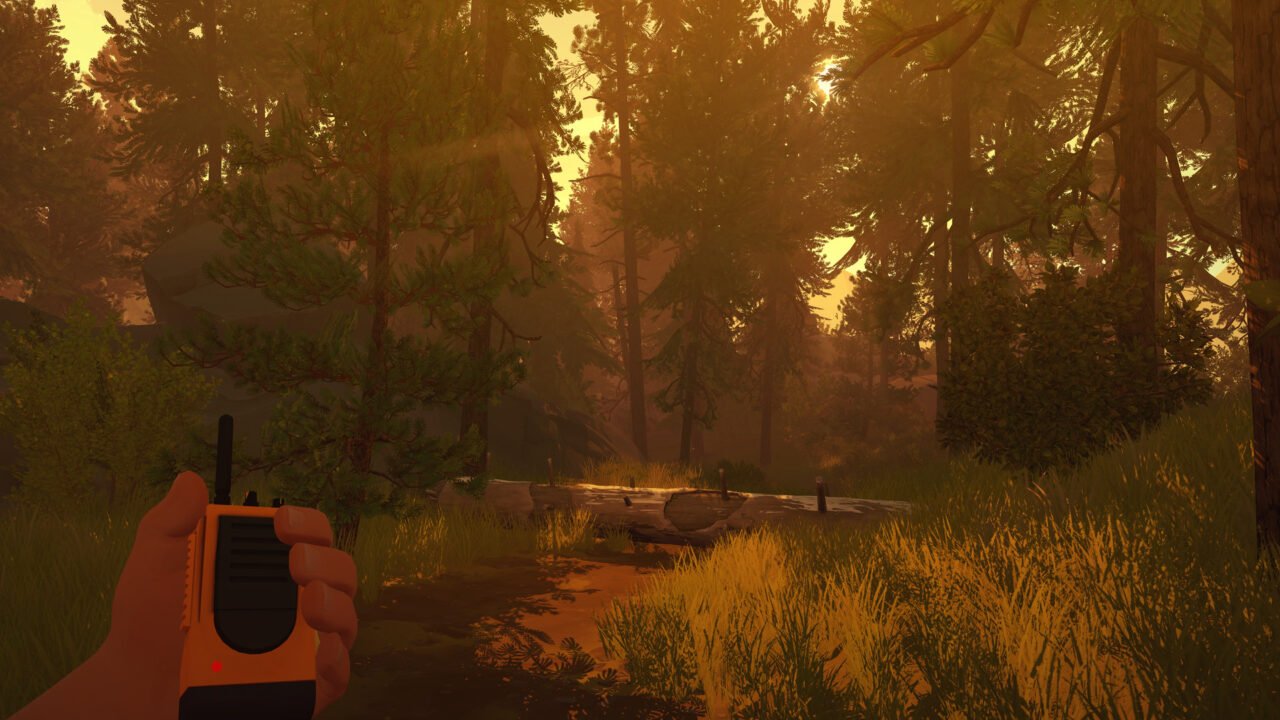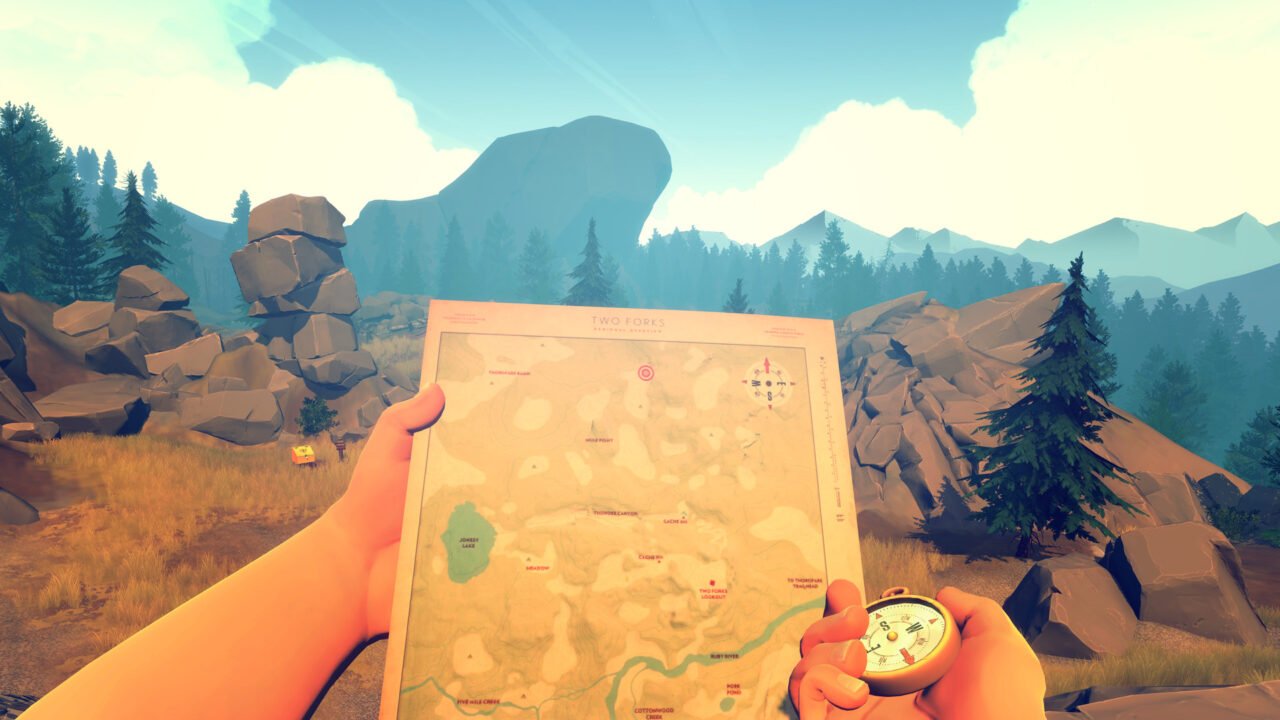Playing Firewatch for the first time today feels oddly belated. Playing any game past its release date is belated in a sense, sure, but in this case, with my tastes in gaming and the acclaim Firewatch received at the time, it’s a mystery I haven’t already played it. For context, I love walking simulators, and during their initial boom in the early to mid 2010’s, I was all for it: Gone Home is one of my favourites in gaming as a whole, The Stanley Parable remains stalwart in its teachings of game design, and even those I’m less ecstatic about like The Beginner’s Guide and Thirty Flights of Loving are well worth anyone’s time for sheer ingenuity in the genre. I’m unsure where Firewatch fits into this equation. Over five years after the fact, despite it’s largely positive reception, I knew of a substantial crowd of detractors to the game’s loyal following, and while I by no means dislike the game, issuing a blanket recommendation seems impossible in the face of some real concerns I have to whether some people will look past the games lowest points.
Stationed up in the Two Forks lookout tower in a Wyoming woodlands, our player protagonist Henry leaves his life of routine, stricken with heartbreak and guilt, hoping to attain any sort of reprieve in his new role as fire lookout. The sedate flow to forest life translates to a game which isn’t shy of taking its time, and with plenty of time on his hands, Henry builds a relationship with his only true human contact, his supervisor, Delilah. Firewatch may don the appearance of a walking simulator, but incorporates elements of hiking and navigation to form an experience unlike others in the genre, mechanically denser, but as the niche often entails, a laser focus on a small cast of characters always remains centre stage.
I’m going to open with some harsh, likely unpopular criticism, partly because I’m not sure whether this is platform specific or not. Despite its striking visual design – the Wyoming woods aren’t exactly a medium staple – Firewatch looked and ran like muck on the Xbox Series X. I specify Microsoft’s latest console, despite the game actually running as an Xbone game, because I’m unsure whether there’s some fuckery going on behind the scenes, backward compatibility features for example messing with the games performance. Starting with the visuals themselves, the actual look of Firewatch has plenty of potential on a thematic level. Forests are often associated with greenery, verdant displays of sprouting shrubbery and densely connected trees. Firewatch isn’t that, instead trading out blooming colour for muted yellows, the same yellow found on the outskirts of a gentle campfire. It’s clearly trying to evoke a sense of serenity, and it does to a degree, all the while indicating the area you safeguard is a moment away from complete conflagration, ripe for a fire to start easy to expand with little challenge. Texture popin, low resolution and a general lack of variety hinder the experience quite a bit however, so much so I never “forgot” I was playing a game per say. Firewatch is a simulation first and foremost, and taking on the role of Henry is made harder by constantly being reminded the world you inhabit is fake. Fake, and also ugly, the popin in particular is so noticeable it couldn’t help but jerk backwards in more open areas where grass just appears in front of you a metre away. It’s made worse by the hard 30fps cap, a ceiling the game often fails to touch, dipping below so inconsistency I makes me wonder if a hard 20fps cap would be less jarring, obviously still bad, but the constant stuttering took me out of the experience just as much as the visual hiccups.
It’s not a complete disaster. The design itself was striking enough to evoke those sensations, and while not ideal, you can eventually excavate onwards and enjoy the heart of the game, of which is a more involved iteration of the walking simulators that came before it. I honestly thought Firewatch was just another walking simulator, something I was totally up for, but its mechanical depth took it in an entirely different direction which gives it a different vibe to others in the niche. The area of Wyoming your lookout surveys feels like perfect in scope; expansive enough to encourage exploring but small enough to avoid feeling like a slog. It’s not open world, and you’re very much guided in one direction at a time, but on each route you can find miscellaneous objects of interest which act as a means of conversation between yourself and Delilah, introducing the core gameplay mechanic: the radio. On your travels, you provide information of the area to your supervisor, while she reciprocates with jokes, anecdotes and general charm. You hit the left trigger to wield your radio and the right trigger to select a dialogue prompt, an unorthodox control scheme which feels weirdly intuitive after a minute or two. A lot of conversations can be lost to the wilderness, where conversation starters on the littering of beer cans or peculiar offerings inside supply boxes are forgon if the player chooses not to radio it in.

And you can play the game that why, but why would you? Unless you’re feeling particularly spiteful towards the game itself, calling in any little item was part of my routine to hear our two main characters speak, both of which are fully voice acted, and both to an outstanding degree. Delilah’s voice acting in specific is so well executed you’d think they’d sent the actor around your house and had them speak the lines into your ears directly. So much passion and range is shown through her performance, which is slightly lacking in Henry’s, but both are well above what was expected. It’s required too, as the conversations between the two are the heart of the game, present when you’re both discussing a point of interest or even just walking an empty trail. While the performances themselves are undeniably superb, the content of their gossip is what’s going to make or break someone’s enjoyment of the game, far before the technical muck intrudes on the experience. In my case, I frequently found their dialogue fun and quick witted, but often annoying, playing into a certain type of American vernacular I just find irritating. Not offensive or bland per say, but over the top, melodramatic, a bit too quippy, as if they were in an eternal state of auditioning for the role of Tony Stark. It’s a hard topic to zero in on, and it’s something you can either understand immediately or just not get. There’s no malice in what I say, only my dry, matter-of-fact British brain butts heads with the bouncy, overly-energetic American patter. The best way to describe Firewatch’s conversations are quick witted in a way in which the characters always feel a bit too smart, a pithy rejoinder loaded and ready to fire at a moment’s notice.
That’s not to say either character is poorly developed because of this, only that it doesn’t suit my tastes. Still, both characters show numerous signs of charm even my dour personality found attractive. Again, Delilah was the star of the show, existing as the more upbeat actor in the pair, likely on the account of not having to deal with a lifelong partner forgetting your very existence. That said, while she indulges frequently in humour, even if miss timed, she still has an authenticity to her to stop her feeling one note. Her past experiences with men and regret for her well intentioned mistakes in her position as a lookout add depth to her character which Henry lacks. Even with his ongoing trauma, Henry often comes off overly stoic and flat, engaging with Delilah’s banter in equal parts, but lacking personality traits which make him an interesting character in isolation. It doesn’t help that the game doesn’t delve into his thoughts on his wife very often, and when it does, it tends to repeat what’s already known rather than using it as a tool to develop his character.

You’d think that element of his life would play a major role in entire game’s plot development, but it never does, and the bulk of the games narrative thrust, initiated half way through the game, is instead one of mystery and conspiracy, one which comes out of left field but ultimately made for genuine intrigue and furthers the importance of Firewatch’s more involved gameplay mechanics. Understanding the game’s links (tangential or not) to games like Gone Home and Virginia played a role in how I perceived the game’s mystery, fully expecting the game to fall off the deep end into abstract storytelling due to the latter relation, all the while preempting misdirection on the account of Gone Home’s “horror red herring”. If placing it in one of the two camps, it certainly falls into the latter, although unlike the “non-twist” found in Gone Home, Firewatch heavily implies a strong shift in the narrative while ultimately being predictable and logical. I use “predictable” in this example to literally mean “capable of being predicted”, not that the story is necessarily trite or simple, in fact quite the opposite. Up until that point of the game, dialogue between Henry and Deliliah established several key plot points which at the time don’t necessarily imply importance. Two teenage girls you meet within the first few minutes of the game go missing swiftly after their brief appearances, while a father and son last known to be in the area have also been missing for years too. All the while, an unexplained fenced off portion of your zone exists, is the place of one of two great fires in the area, and the prospect of conspiracy – involving studious, clandestine research on both characters and their ties to both potential murder and arson – takes centre stage as the once quaint character study of a broken man and lonely lady spiral into insanity.
It’s a lot to take in, and inside this grand plot exists plenty of logical errors and shaky character developments, but on the whole serves the game well as throughout I felt compelled to protest and prove our main characters’ innocence in the face of an unseen force with motives neither character understands. With such strong conspiratorial themes, I can’t be blamed for expecting a shift into the surreal, one dialogue prompt even allowing us to claim Deliliah is either part of the conspiracy or even a figment of our imagination, tying back to the game’s initial plot point of mental illness. Using our recently developed hiking skills, we sprint around the forest attempting to find any semblance of logic behind what’s going on: where are the missing teens, who started the fires, who was the cloaked man we saw on our second day, could that be the missing father? Those “logical errors” in the plot however come back to bite the game’s intrigue as the mystery unfolds, poking holes in the fabric of the plot to a degree I was incapable of looking past. The fence for example, an expansive, metal sheet guarding a vast amount of land is, somehow, a total mystery, both to Henry and Deliliah, the latter of which has worked in the area for years. Engaging in dialogue about the subject does nothing to alleviate worries that it’s a poorly thought out plot element, as they question whether perhaps it exists to keep hedgehogs in, Delilah jokes about the New Zealand government wondering why all their hedgehogs are being hidden in Wyoming. It’s a cute line of dialogue in isolation, but doesn’t do anything to make sense of something which becomes instrumental in the game’s narrative.
There are going to be people that can look past elements like this and engage with the story far more than I did, because I will hold my hands up and say I was constantly picking apart logical inaccuracies which reduced the amount of energy I put into analysing the themes of the game itself. I can place part of the blame on myself in that regard, because I can tell without analysis Firewatch contains plenty of interconnected plot points and themes which do weave in elegantly, only hindered by things which prod at the pragmatic part of my brain so much I couldn’t appreciate them. As a result, the parts of the game I enjoyed the most were the slower paced character moments, where Henry, new to his position as a lookout, probes Deliliah on things like a child ceaselessly questioning the “why’s” to everything, and in response, Delilah’s able to blossom into the witty jester she truly is. It’s no wonder then that the ending came as a massive disappointment to me as the game becomes too self-serious to the point where both Henry and Delillah act irrationally and lose their charm. To avoid spoilers lets just repeat the fact Firewatch has an element of predictability, so much so I believe a lot of people will find the ending quite anticlimactic, coming off the tailend of a narrative peak brimming with endless possibilities.
Looping back to the introduction: do I recommend Firewatch? Well I do think Firewatch is a game most people can get something out of. Followers of the walking simulator genre will have likely already played it given the game’s prestigious legacy, but if you do consider yourself a fan of niche and haven’t played it yet, then yes, Firewatch’s mechanical depth adds something to a genre which prides itself on the opposite. In the same regard, I don’t think Firewatch loses focus on what the genre does best in terms of storytelling. It is first and foremost a game about two characters and how their relationship grows, and through the strengths of simplicity – even with the added complexity of the hiking mechanics – it’s a game which feels accessible to people regardless of their proficiency in gaming. And people that don’t like walking simulators, here you have an example of one which feels distinctly different from any other I’ve played, leaning further into the “simulation” side of the equation much stronger than I’ve seen any other game do so. Issuing Firewatch the recommended badge comes from a place of understanding how my own personal tastes differ from others, acknowledging a game’s potential quality even if it’s largely unseen by myself, and how reviews are worth far more than the final number. It’s not a game I will hold dear to my heart, and that much should already be apparent, and if I’ve done a decent enough job writing this review, the fact you might hold it closer to your own should be clear too.

